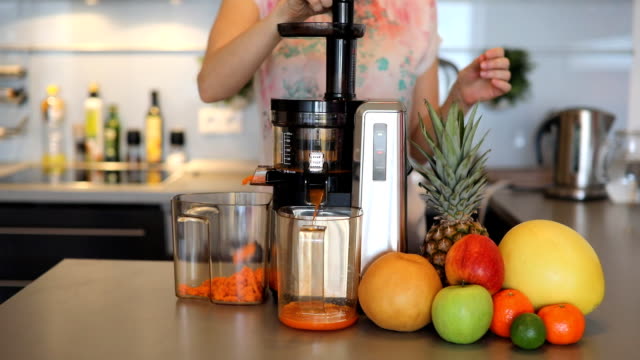Types of Home Juicer Machine

Health is one essential factor that humans cannot avoid or ignore, being healthy is the most important aspect of our life. To bring complete nutrients into our body, drinking juice plays a vital role, there are a lot of juice shops where anyone can get it. For Cost reduction and making it home even drinking a small juicer is fair enough to maintain health. For that, some juice machines can be bought and anyone can make juice in-home or do business.
Centrifugal Force Juicer
Most home juicers are centrifugal juicers, often known as fast juicers. One of the greatest selling points is the low cost of the juicer. Fresh produce is fed through a tube to a blade that is spinning at speeds of up to 14,000 RPM. Using the centrifugal force of the spinning basket, the juice is pushed to the sides and forced through a sharp screen and into an empty jug or a glass. The juice from a centrifugal juicer tends to separate quickly and contains up to 30% solids, such as skins, seeds, and stems.
Masticating Juicer
Masticating juicers are also referred to as slow juicers because of the way they chew their food. For crushing, they use a slow auger (gear) that rotates at 80 to 100 RPM to push the fruit or vegetable into a sharp mesh and then through it. The juice is a pulpy, frothy result with a harsh taste and a thick, chunky mouth-feel that can be difficult to drink. The term “cold-pressed” is often used to describe masticating juicers that lack a press. Anyone wishing to maximize the nutrients in their juices and is prepared to spend a little extra time doing so would benefit from this small juicer.
Twin Gear Juicer
In a twin gear juicer, two augers (gears) revolve and suck the produce into the machine, where it’s chewed up. As the produce is pushed past a screen of decreasing size, the augers extract the juice. A lot of bad stuff gets through, adulterating the juice with up to 30 percent of solid matter such as skins, seeds, and stems.
Juice Press
There are two types of presses: hydraulic and pneumatic. Some people call them two-stage presses since they have two stages: Firstly, the produce is crushed up into pulp, and then the juice is gently extracted by pressing the pulp under thousands of pounds of pressure over a prolonged time period. Since the word “cold-press” was coined to refer to a juice press, the term is now used to refer to different types of juicers. A genuine juice press, therefore, is the only form of juicer that can produce cold-pressed juices.
Conclusion:
With these machines anyone can make a small juicer at their own convenience, most importantly these machines are cheaper to buy and cover a wide range of applications. This is definitely going to help those looking to drink juice in their own time, also those who suffer from some nutrient disease will be free from a financial burden and better result in making their healthy juice to avoid buying juice from shops only.


